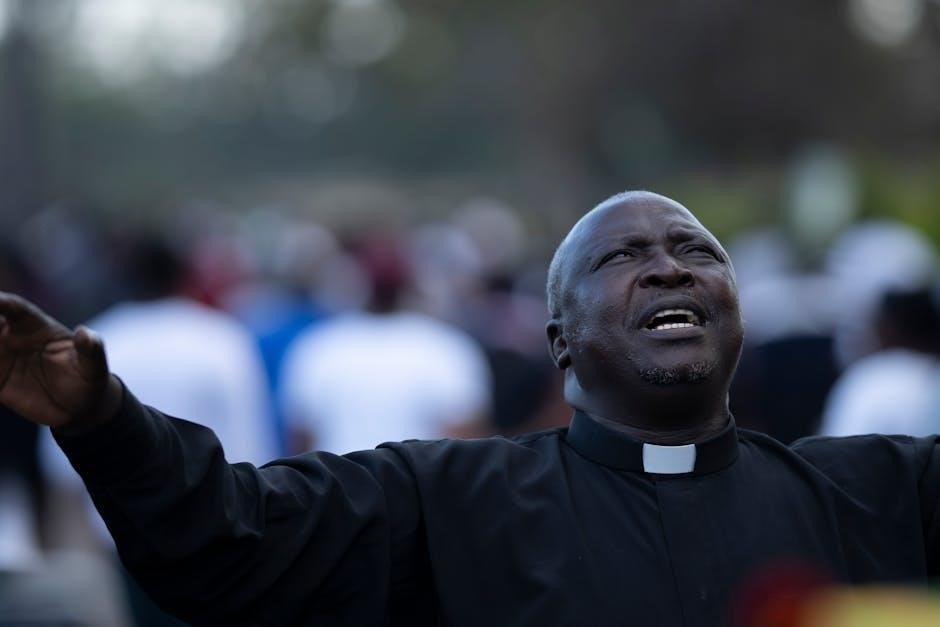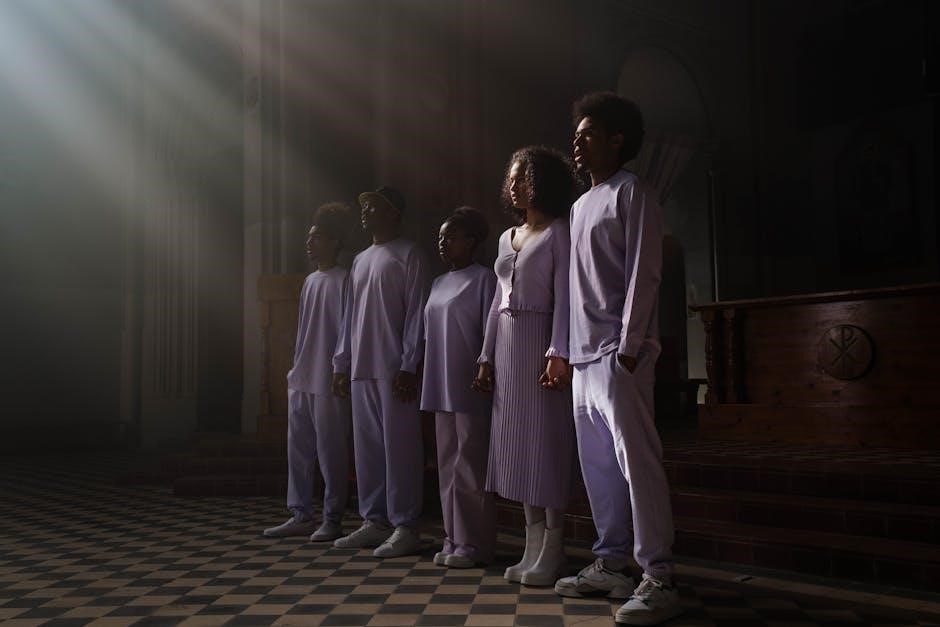Guide Me O Thou Great Jehovah Lyrics in Black Gospel Music
The hymn Guide Me O Thou Great Jehovah holds a revered place in Black Gospel Music, offering powerful lyrics that seek divine guidance and strength. Its soul-stirring melodies and imagery, such as the “bread of heaven” and “healing streams,” resonate deeply in worship, fostering a sense of community and hope.
Historical Background of the Hymn
The hymn Guide Me O Thou Great Jehovah was originally written by Welsh poet and minister William Williams in 1745. Titled Arglwydd, Awain Twyr Aialwch in Welsh, it was later translated into English by Peter Williams in 1772. The hymn is set to the iconic tune CWM RHONDDA, composed by John Hughes in 1907, which has become inseparable from the lyrics.
The hymn reflects Williams’ deep faith and his experiences as a pilgrim and leader in the Welsh Calvinistic Methodist revival. Its themes of divine guidance, strength, and provision resonated deeply with the spiritual journeys of believers. The lyrics, such as “Bread of heaven, feed me now and evermore,” symbolize a longing for spiritual nourishment and trust in God’s sovereignty.
In the context of Black Gospel Music, the hymn found new life during the 19th century, as African American communities embraced its powerful imagery and message of hope. It became a anthem of resilience, mirroring the struggles and aspirations of a people seeking freedom and salvation. Over time, its timeless message has endured, making it a cornerstone of worship across generations.
Theological Significance in Black Gospel Tradition
The hymn Guide Me O Thou Great Jehovah carries profound theological significance in Black Gospel Music, embodying themes of divine guidance, providence, and redemption. Its lyrics, such as “Guide me, O thou great Jehovah,” reflect a deep trust in God’s sovereignty and a reliance on His strength in times of weakness.
The hymn’s imagery, like “bread of heaven” and “healing streams,” symbolizes spiritual nourishment and divine healing, resonating with the African American experience of seeking comfort and deliverance. It underscores the belief in God’s active role in human lives, offering hope and sustenance amidst adversity.
In Black Gospel tradition, the hymn is often seen as a prayer for deliverance and a declaration of faith in God’s ability to lead His people through challenging circumstances. Its emphasis on community worship and collective reliance on God aligns with the communal nature of Black Gospel Music, fostering unity and shared spiritual purpose.
Ultimately, the hymn’s theological depth and universal themes of trust, redemption, and divine providence have cemented its place as a cherished expression of faith in Black Gospel Music, inspiring generations to seek God’s guidance and strength.

Cultural Impact and Usage in Worship
The hymn Guide Me O Thou Great Jehovah has left an indelible mark on Black Gospel Music, transcending cultural boundaries while deeply resonating with African American spiritual traditions. Its powerful lyrics and stirring melodies have made it a cornerstone of worship in many churches, fostering a sense of collective devotion and hope.
In Black Gospel services, the hymn is often sung with passionate harmonies and rhythmic accompaniment, creating an atmosphere of spiritual upliftment. Its themes of divine guidance and deliverance resonate particularly with communities that have historically faced adversity, offering solace and assurance of God’s presence.
The hymn’s cultural impact extends beyond religious settings; it has been performed by renowned Black Gospel artists, blending traditional and contemporary styles. Its adaptability to various musical arrangements has ensured its relevance across generations, making it a unifying force in worship and a celebration of shared faith.

Today, Guide Me O Thou Great Jehovah remains a cherished hymn in Black Gospel Music, symbolizing resilience, hope, and the enduring power of collective worship. Its influence continues to inspire both congregations and artists, ensuring its place in the cultural and spiritual heritage of the African American community.
Analysis of Specific Lyrics and Their Spiritual Meaning
The lyrics of Guide Me O Thou Great Jehovah are rich with spiritual symbolism and profound theological depth. The opening line, “Guide me, O Thou Great Jehovah
The line “I am weak, but Thou art mighty” underscores the contrast between human frailty and divine omnipotence, fostering a sense of humility and trust in God’s power. The repeated refrain, “Bread of heaven, feed me now and evermore
Other verses, such as “Open now the crystal fountain, whence the healing stream doth flow
The chorus, with its emphasis on Christ’s presence “before me, behind me, and within me
Connection to the African American Worship Experience
The hymn Guide Me O Thou Great Jehovah deeply resonates within the African American worship experience, where themes of resilience, divine guidance, and communal hope are central. Its lyrics, such as “pilgrim through this barren land
In Black Gospel traditions, the hymn is often sung with emotive intensity, fostering a sense of collective worship and shared identity. The call for God’s strength in weakness aligns with the experiences of many African American congregants, who have historically found empowerment in their faith. The hymn’s emphasis on communal reliance on God underscores the importance of faith as a unifying force in the African American community, providing a spiritual anchor during times of challenge and celebration alike.
Prominent Black Gospel Artists Performing the Hymn
The hymn Guide Me O Thou Great Jehovah has been embraced by numerous prominent Black Gospel artists, who have infused their unique styles into its timeless lyrics. Artists like Charlotte Church and Sovereign Grace Music have delivered powerful renditions, blending traditional and contemporary elements. The Grimethorpe Colliery Band has also performed an instrumental version, showcasing the hymn’s universal appeal. Additionally, Jeremy Casella of Indelible Grace has reimagined the hymn, bringing a fresh yet respectful interpretation to its classic melody. These artists, along with others in the Black Gospel tradition, have helped preserve the hymn’s legacy while introducing it to new generations. Their performances highlight the enduring spiritual and emotional resonance of Guide Me O Thou Great Jehovah in the African American worship experience. Through their contributions, the hymn remains a cornerstone of Gospel music, bridging the past and present with its message of hope and divine guidance.
Modern Arrangements and Interpretations
Modern arrangements of Guide Me O Thou Great Jehovah have breathed new life into the classic hymn, making it accessible to contemporary audiences while preserving its spiritual essence. Many Black Gospel artists and musicians have reimagined the hymn with fresh instrumentation and styles. For instance, Sovereign Grace Music has released a modern rendition that blends traditional lyrics with a contemporary worship sound. Similarly, Charlotte Church has performed a soulful version, infusing the hymn with powerful vocals and emotional depth. Other artists have incorporated genres like urban gospel and hip-hop, creating a fusion that resonates with younger generations. Additionally, instrumental versions, such as piano or orchestral arrangements, offer a minimalist yet profound interpretation. These modern takes highlight the hymn’s versatility and its ability to transcend time and cultural boundaries. By adapting the hymn to modern musical styles, artists ensure its message of divine guidance and hope continues to inspire diverse audiences in the 21st century.
Role in Worship Services and Community Building

Guide Me O Thou Great Jehovah plays a vital role in worship services within Black Gospel Music traditions, serving as a unifying hymn that strengthens congregational bonds. Its powerful lyrics, such as “I am weak, but Thou art mighty,” foster a collective reliance on divine strength, creating a shared spiritual experience. The hymn is often sung during moments of reflection, prayer, or transitional periods in worship, helping believers connect with God and one another. Its repetitive refrains and memorable melody make it easy for large groups to sing together, amplifying the sense of unity and communal faith.

Additionally, the hymn is frequently used in community-building efforts, such as revivals, conferences, and outreach programs; Its universal message of guidance and hope transcends individual struggles, allowing it to resonate with diverse audiences. In Black Gospel contexts, the hymn’s inclusion in worship services underscores its enduring relevance as a tool for spiritual upliftment and communal empowerment, bridging generational and cultural gaps within the faith community.
Comparison with Other Gospel Hymns
Guide Me O Thou Great Jehovah stands alongside other iconic gospel hymns like How Great Thou Art and Amazing Grace in its profound theological depth and emotional resonance. While these hymns share themes of divine sovereignty and human dependence, Guide Me O Thou Great Jehovah uniquely emphasizes the pilgrim’s journey and communal reliance on God. Its focus on guidance and strength aligns it with hymns like Great Is Thy Faithfulness, yet its specific imagery, such as the “crystal fountain” and “cloudy pillar,” offers distinct poetic richness.
Compared to more contemporary gospel songs, this hymn’s traditional structure and timeless lyrics make it a bridge between classic and modern worship. Its versatility allows it to be sung in both intimate and large congregational settings, much like Be Thou My Vision. The hymn’s enduring popularity highlights its universal appeal, as its themes of trust and redemption transcend cultural and generational boundaries within the Black Gospel tradition.
Resources for Learning and Singing the Hymn
For those seeking to learn and sing Guide Me O Thou Great Jehovah, numerous resources are available. The hymn’s lyrics can be found in various Christian hymnals, including those specific to Black Gospel traditions. Additionally, MIDI files, PDF scores, and audio recordings are widely accessible online, providing tools for both individual and congregational worship.
Platforms like Sovereign Grace Music and Grace Community Church offer official lyric videos and sheet music, making it easier for worshippers to engage with the hymn. Many artists, such as Charlotte Church, have recorded powerful renditions that inspire and guide singers. Online communities and forums dedicated to gospel music also share tips for harmonizing and arranging the hymn in diverse styles.
Furthermore, apps and websites specializing in worship music provide chord charts, instrumental tracks, and tutorials. These resources cater to both seasoned musicians and newcomers, ensuring that the hymn remains accessible and vibrant across generations. Whether for personal devotion or communal praise, these tools help keep the legacy of Guide Me O Thou Great Jehovah alive and thriving.
Guide Me O Thou Great Jehovah remains a timeless and powerful hymn in Black Gospel Music, transcending generations with its profound lyrics and soul-stirring melodies. Its enduring legacy lies in its ability to resonate deeply with worshippers, offering comfort, strength, and hope in times of need. The hymn’s themes of divine guidance, redemption, and trust in God continue to inspire believers, fostering a spiritual connection that unites congregations worldwide.
Its influence extends beyond traditional worship, as modern artists and arrangements breathe new life into the classic hymn, ensuring its relevance in contemporary gospel music. As a testament to faith and resilience, Guide Me O Thou Great Jehovah stands as a cornerstone of gospel heritage, reminding all who sing it of God’s steadfast presence and provision. Its legacy will undoubtedly endure, a cherished part of the spiritual journey for generations to come.
